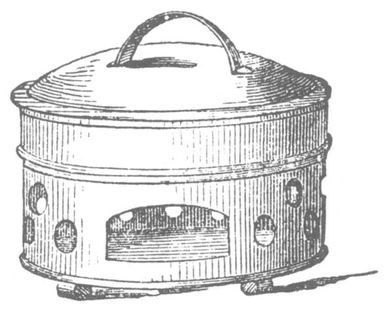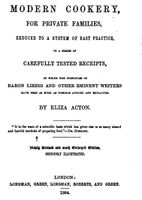Advertisement
Broiling
By Eliza Acton
Published 1845

Broiling is the best possible mode of cooking and of preserving the flavour of several kinds of fish, amongst which we may specify mackerel and whitings; it is also incomparably superior to frying for steaks and cutlets, especially of beef and mutton; and it is far better adapted also, to the preparation of food for invalids; but it should be carefully done, for if the heat be too fierce, the outside of the meat will be scorched and hardened so as to render it uneatable; and if, on the contrary, it be too gentle, the gravy will be drawn out, and yet the flesh will remain so entirely without firmness, as to be unpleasant eating. A brisk fire, perfectly free from smoke, a very clean gridiron, tender meat, a dish and plates as hot as they can be, and great despatch in sending it to table when done, all are essential to the serving of a good broil. The gridiron should be heated, and rubbed with mutton suet before the meat is laid on, and it should be placed slopingly over the fire, that the fat may run off to the back of the grate, instead of falling on the live coals and smoking the meat: if this precaution should not prevent its making an occasional blaze, lift the gridiron quickly beyond the reach of the smoke, and hold it away until the fire is clear again. Steaks and chops should be turned often, that the juices may be kept in, and that they may be equally done in every part. If, for this purpose, it should be necessary for want of steak-tongs to use a fork, it should be passed through the outer skin or fat of the steak, but never stuck into the lean, as by that means much of the gravy will escape. Most eaters prefer broiled beef or mutton, rather underdressed; but lamb or pork cutlets should always be thoroughly cooked. When a fowl or any other bird is cut asunder before it is broiled, the inside should first be laid to the fire: this should be done with kidneys also. Fish is less dry and of better flavour, as well as less liable to be smoked, if it be wrapped in a thickly buttered sheet of writing paper before it is placed on the gridiron. For the more delicate-skinned kinds, the bars should be rubbed with chalk instead of suet when the paper is omitted. Cutlets, or meats of any other form, when egged and crumbed for broiling, should afterwards be dipped into clarified butter or sprinkled with it plentifully, as the egg-yolk and bread will otherwise form too dry a crust upon it. French cooks season their cutlets both with salt and pepper, and brush a little oil or butter over them to keep them moist; but unless this be done, no seasoning of salt should be given them until they are just ready to be dished: the French method is a very good one.

